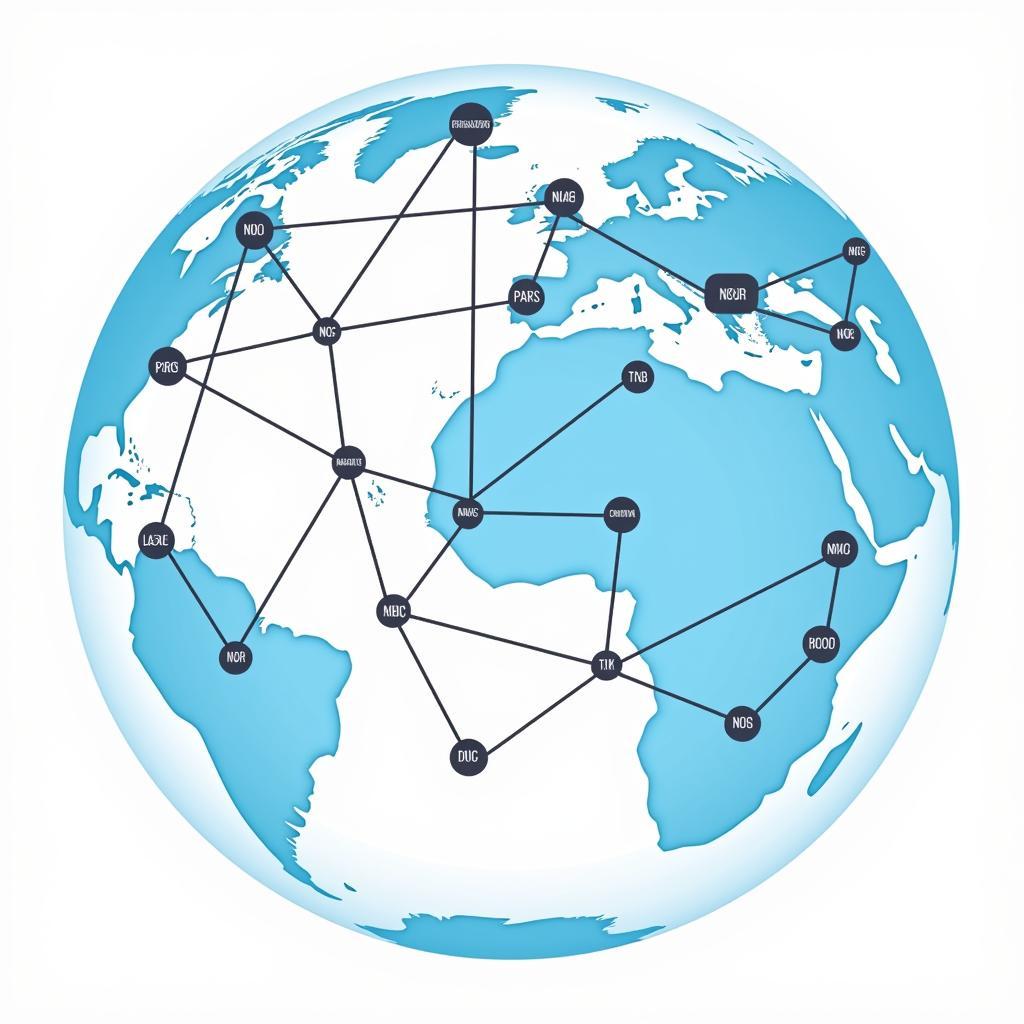The International Relations Society, a multifaceted and ever-evolving landscape, plays a crucial role in shaping our globalized world. This intricate web of relationships between states, non-governmental organizations (NGOs), and international organizations impacts everything from trade and security to human rights and environmental protection.
Delving into the Core of International Relations
At its heart, the study of international relations seeks to understand the interactions between different actors on the world stage. This includes analyzing the motivations, interests, and power dynamics that shape their decisions and actions. By examining historical events, political ideologies, and economic forces, we gain insights into the complexities of global affairs.
 Global Network of International Relations
Global Network of International Relations
Key Actors in the International System
The international relations society comprises a diverse range of actors, each playing a distinct role:
-
Nation-States: As the primary units of the international system, nation-states possess sovereignty over their territory and citizens. They engage in diplomacy, form alliances, and sometimes resort to military force to advance their national interests.
-
International Organizations: Established by treaties or agreements between states, international organizations like the United Nations (UN) and the World Trade Organization (WTO) provide a platform for cooperation, conflict resolution, and the development of international law.
-
Non-Governmental Organizations (NGOs): Operating across borders and independent of governments, NGOs like Amnesty International and Doctors Without Borders advocate for specific causes, provide humanitarian aid, and monitor human rights violations.
The Evolving Nature of Global Challenges
The international relations society confronts a myriad of challenges in the 21st century, including:
-
Climate Change: This global crisis demands collective action to reduce greenhouse gas emissions and mitigate the impacts of a warming planet.
-
Terrorism: The rise of transnational terrorist organizations poses significant threats to international security and stability.
-
Cybersecurity: As our reliance on technology grows, so too do the risks of cyberattacks, highlighting the need for international cooperation to protect critical infrastructure and data.
-
Global Inequality: The widening gap between rich and poor countries fuels social unrest, migration, and conflict, demanding innovative solutions to promote sustainable development and equitable distribution of resources.
 Collage Representing Global Challenges
Collage Representing Global Challenges
The Importance of Dialogue and Diplomacy
In an increasingly interconnected world, fostering understanding and cooperation between different cultures and nations is paramount. Diplomacy, dialogue, and the peaceful resolution of disputes are essential to maintaining global peace and stability.
Why Liberal Universalism is Functional for Society
The concept of liberal universalism, advocating for the application of universal human rights and values across all societies, plays a vital role in shaping a more just and equitable world. This approach emphasizes the inherent dignity and worth of every individual, regardless of their nationality, ethnicity, religion, or any other status. By promoting principles of freedom, equality, and the rule of law, liberal universalism seeks to create a global order where all individuals have the opportunity to thrive.
why liberal universalism funtional for society
The Role of International Relations Societies
Organizations dedicated to the study and advancement of international relations play a crucial role in fostering global understanding. These societies:
- Facilitate Research and Scholarship: By supporting academics, researchers, and practitioners, these societies contribute to the development of new knowledge and insights into global issues.
- Promote Dialogue and Collaboration: Through conferences, workshops, and publications, they create platforms for experts and policymakers to exchange ideas and collaborate on solutions.
- Educate the Public: By engaging with the wider community, international relations societies raise awareness about global challenges and the importance of international cooperation.
Conclusion
The international relations society is a complex and dynamic field, constantly evolving in response to new challenges and opportunities. Understanding the key actors, principles, and issues that shape global affairs is essential for navigating our interconnected world and building a more peaceful and prosperous future for all.
FAQs about International Relations Societies
1. What is the purpose of an international relations society?
International relations societies serve as platforms for promoting research, dialogue, and education in the field of international affairs. They bring together scholars, practitioners, and the public to foster understanding and cooperation on global issues.
2. How can I get involved in an international relations society?
Many international relations societies offer membership opportunities for individuals interested in global affairs. You can join their events, participate in discussions, and contribute to their publications.
3. What are some of the leading international relations societies?
Some prominent international relations societies include the International Studies Association (ISA), the European International Studies Association (EISA), and the British International Studies Association (BISA).
4. Why is the study of international relations important?
In an increasingly interconnected world, understanding international relations is crucial for addressing global challenges, promoting peace and security, and fostering economic development.
5. What are some career paths in international relations?
Careers in international relations are diverse and include roles in diplomacy, international organizations, NGOs, academia, journalism, and government agencies.
You might also be interested in:
Need help? Contact us:
- Phone: 02043854663
- Email: [email protected]
- Address: Khu 34, Bắc Giang, 260000, Việt Nam
We are available 24/7 to assist you.